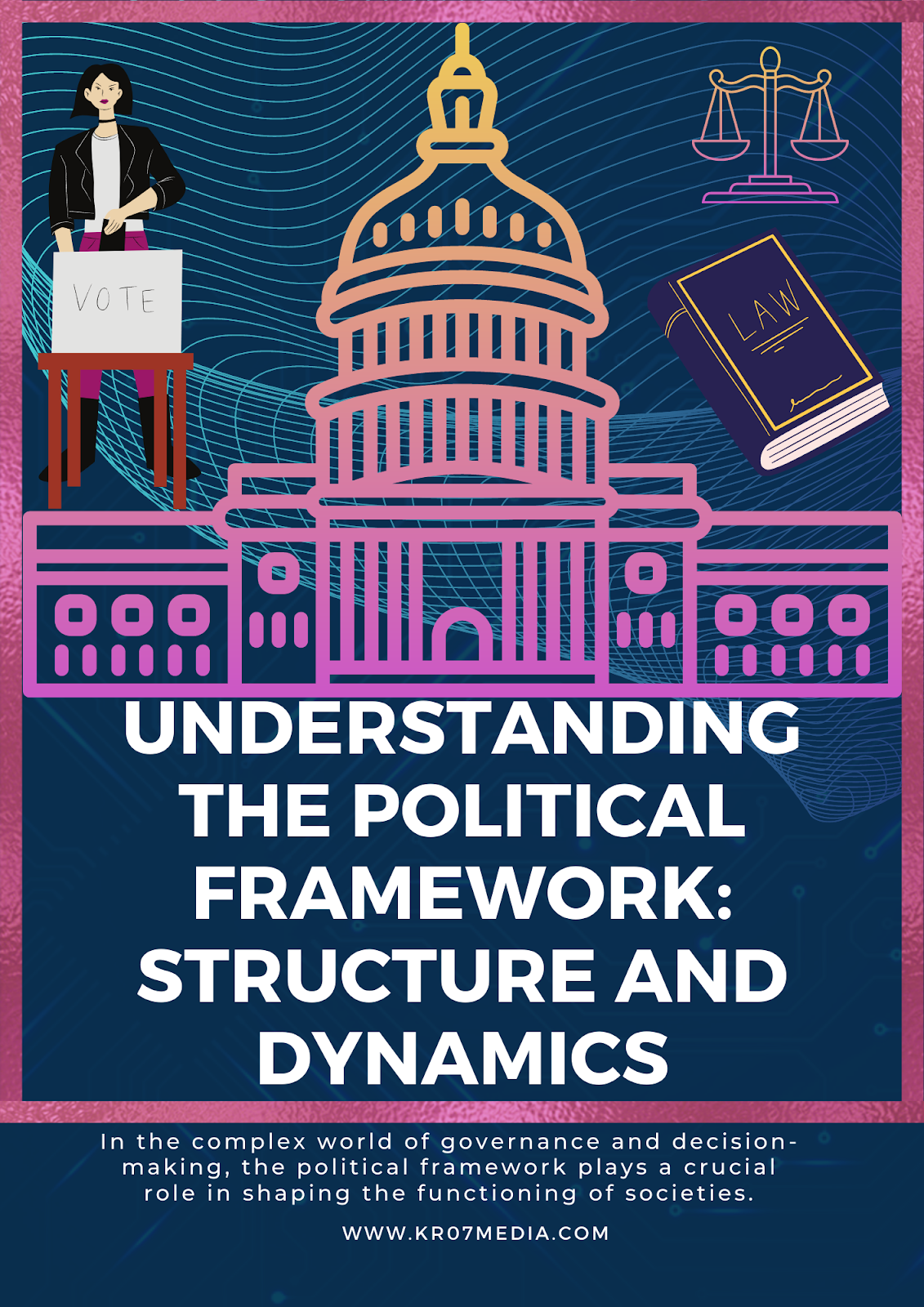Introduction
In the complex world of governance and decision-making, the political framework plays a crucial role in shaping the functioning of societies. Political frameworks are structures and systems that guide how power is distributed, institutions operate, and policies are formulated and executed. They are fundamental to understanding how societies organize themselves and how they address the needs and aspirations of their citizens. In this article, we will explore the key components and dynamics of political frameworks, examining their significance and impact on societies.
Components of the Political Framework
a. Government Structure:
The most visible aspect of any political framework is its government structure. This refers to the organization of political institutions, such as the executive, legislative, and judiciary branches, and the relationships between them. Different political systems, such as democracies, republics, monarchies, and authoritarian regimes, have varying government structures that influence decision-making and accountability.
b. Political Parties and Elections:
Political parties are essential components of modern political frameworks. They serve as the vehicles through which candidates seek public office and present their ideologies and policies. Elections provide citizens with the opportunity to participate in the democratic process by choosing their representatives and leaders, contributing to the legitimacy of the political system.
c. Civil Society:
Civil society represents the collective interests, values, and activities of individuals and organizations outside of the government. It includes NGOs, advocacy groups, trade unions, and community organizations that play a critical role in shaping public opinion, influencing policies, and holding the government accountable.
d. Media and Information Flow:
The media serves as a bridge between the government and the public, providing information and analysis that informs citizens' decisions and political engagement. The freedom and independence of the media are vital for a healthy political framework, as it ensures transparency and keeps those in power in check.
e. Rule of Law:
The rule of law ensures that the legal system is impartial, fair, and accessible to all citizens. It underpins the protection of individual rights and provides a mechanism for resolving disputes and upholding justice, thereby preventing arbitrary exercises of power.
Dynamics of the Political Framework
a. Power Distribution and Balance:
Political frameworks are shaped by the distribution and balance of power among different branches of government, political parties, interest groups, and societal forces. The dynamics of power influence decision-making processes, policy outcomes, and the overall stability of the system.
b. Political Participation and Engagement:
The level of political participation and engagement among citizens directly impacts the legitimacy and effectiveness of the political framework. High levels of political participation, such as voting, activism, and civic engagement, strengthen the democratic process and ensure that government actions reflect the will of the people.
c. Political Culture and Ideology:
The prevailing political culture and dominant ideologies influence the attitudes, values, and beliefs of citizens and political actors. These factors shape public opinion, electoral choices, and policy preferences, driving the direction of the political framework.
d. Interplay of Domestic and International Factors:
Political frameworks do not exist in isolation; they interact with and are influenced by domestic and international factors. Economic conditions, technological advancements, geopolitical developments, and global trends can all impact a nation's political framework and policy decisions.
Conclusion
The political framework is the foundation upon which societies are built and governed. It encompasses government structures, political parties, civil society, media, and the rule of law, all of which shape the functioning of a political system. The dynamics within the political framework, including power distribution, political participation, and prevailing ideologies, determine the effectiveness and responsiveness of governance.
Understanding the political framework is essential for citizens to actively participate in the democratic process, hold governments accountable, and advocate for positive change. As societies evolve, so too must their political frameworks adapt to address emerging challenges and meet the aspirations of their citizens for a better, more inclusive future.
In conclusion, gaining a comprehensive understanding of the political framework is crucial for comprehending the complexities that underlie the structure and dynamics of any society. Politics serves as the bedrock upon which nations and communities are built, shaping their destinies and determining their trajectories. By delving into the intricacies of this framework, we can discern the power structures, decision-making processes, and societal interactions that drive political systems.
Throughout this study, we have explored the multifaceted nature of the political framework, recognizing that it encompasses not only the formal institutions and governing bodies but also the informal networks, ideologies, and socio-cultural factors that influence political behavior. We have observed how political actors, whether individuals or groups, navigate their roles, interests, and objectives within this ever-evolving landscape, shaping policies and influencing public opinion.
Furthermore, an in-depth understanding of the political framework reveals the interplay between power and accountability, showcasing how leaders wield authority and how citizens can hold them responsible. The dynamics of governance, whether democratic or authoritarian, are illuminated through the lenses of representation, participation, and the distribution of resources.
In this journey, we have also recognized the significance of historical context and external influences in shaping political structures and dynamics. Geopolitical factors, global trends, and technological advancements all contribute to the ebb and flow of political systems, transforming the way societies interact and making the political framework an evolving entity.
While understanding the political framework is essential for scholars, policymakers, and citizens alike, it is equally important to approach this endeavor with an open mind, acknowledging the inherent complexities and nuances that resist simplistic categorizations. Embracing diverse perspectives and engaging in constructive dialogue are key to fostering inclusive and robust political environments.
Ultimately, the pursuit of understanding the political framework is an ongoing and dynamic process. As new challenges and opportunities emerge, so too will our comprehension of political structures and dynamics evolve. By continuously exploring, questioning, and learning, we can pave the way for a more informed, engaged, and resilient political landscape, one that can adapt and thrive in the face of change, ensuring a better future for generations to come.



